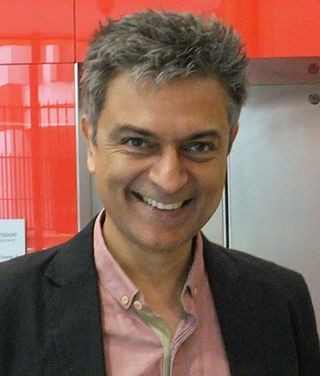Related Research Articles

Enterprise resource planning (ERP) is the integrated management of main business processes, often in real time and mediated by software and technology. ERP is usually referred to as a category of business management software—typically a suite of integrated applications—that an organization can use to collect, store, manage and interpret data from many business activities. ERP systems can be local-based or cloud-based. Cloud-based applications have grown in recent years due to the increased efficiencies arising from information being readily available from any location with Internet access.
A management information system (MIS) is an information system used for decision-making, and for the coordination, control, analysis, and visualization of information in an organization. The study of the management information systems involves people, processes and technology in an organizational context. In other words, it serves, as the functions of controlling, planning, decision making in the management level setting.
A family business is a commercial organization in which decision-making is influenced by multiple generations of a family, related by blood, marriage or adoption, who has both the ability to influence the vision of the business and the willingness to use this ability to pursue distinctive goals. They are closely identified with the firm through leadership or ownership. Owner-manager entrepreneurial firms are not considered to be family businesses because they lack the multi-generational dimension and family influence that create the unique dynamics and relationships of family businesses.
Quality management ensures that an organization, product or service consistently functions well. It has four main components: quality planning, quality assurance, quality control, and quality improvement. Quality management is focused both on product and service quality and the means to achieve it. Quality management, therefore, uses quality assurance and control of processes as well as products to achieve more consistent quality. Quality control is also part of quality management. What a customer wants and is willing to pay for it, determines quality. It is a written or unwritten commitment to a known or unknown consumer in the market. Quality can be defined as how well the product performs its intended function.
Harold D. (Howdy) Koontz was an American organizational theorist, professor of business management at the University of California, Los Angeles and a consultant for many of America's largest business organizations. Koontz co-authored the book Principles of Management with Cyril J. O'Donnell; the book has sold around two million copies and has been translated into 15 languages.
Michael Christopher Jackson OBE is a British systems scientist, consultant and Emeritus Professor of Management Systems and former Dean of Hull University Business School, known for his work in the field of systems thinking and management.

A management control system (MCS) is a system which gathers and uses information to evaluate the performance of different organizational resources like human, physical, financial and also the organization as a whole in light of the organizational strategies pursued.
Peter Mark Pruzan is a Danish organizational theorist, management consultant, and Emeritus Professor of Systems Science at the Department of Management, Politics & Philosophy at the Copenhagen Business School (CBS) in Denmark. Pruzan is known for work on corporate governance and values-based leadership. He became a naturalized Danish citizen in 1973.
Robert Newton Anthony was an American organizational theorist, and professor of management control at Harvard Business School, known for his work in the field of management control systems.
Guy Doumeingts is a French engineer, Emeritus professor at the University of Bordeaux 1 and former Director of "Laboratoire d’Automatique, Productique Signal et Image" control theory, known for the development of the GRAI method and his contributions to the field of Enterprise modelling.
Teemu Malmi is a Finnish organizational theorist, a professor at the Aalto University, Department of Accounting and Finance, and Chairman of the Board of the Aalto University Executive Education. He is known for his research on the use of the balanced scorecard in Finnish companies and his work on management control systems.

Gary John Previts an American accountant, is a Distinguished University Professor Emeritus at Case Western Reserve University. From 1979 to June 30, 2023 he was Professor of Accountancy in the Weatherhead School of Management teaching undergraduate, masters, and doctoral courses. He is known for his work on the history of the theory and practice of accountancy.

Alnoor Bhimani is Professor of Management Accounting and Director of the South Asia Centre at the London School of Economics and Political Science (LSE). He is former Head of the Department of Accounting and the Founding Director of LSE Entrepreneurship. Bhimani's academic work covers financial management and digitalisation; managerial accounting and strategic finance; entrepreneurship and economic growth; and global development and governance issues.

Yves Gendron is a Canadian accounting academic at Laval University in Quebec. He is a qualitative researcher, largely known for his studies in corporate governance, social accountability of auditors, and professional legitimacy. He is co-editor-in-chief of Critical Perspectives on Accounting.
Robert Simons is an American economist currently the Charles R. Williams professor at Harvard Business School. He did his Ph.D. at McGill University
Tobias Scheytt is a German Professor of Management Accounting and Control, Head of the Department of Management Accounting and Control (ICU), and Head of the Centre of Postgraduate Education (ZWW) at the Helmut Schmidt University in Hamburg. Scheytt's academic work covers control systems; risk and risk management; quality management; business development; and public and expert organizations.

Prem Nath Sikka, Baron Sikka is a British-Indian accountant and academic. He holds the position of Professor of Accounting at the University of Sheffield, and is Emeritus Professor of Accounting at the University of Essex.

Christine Cooper is a British accounting academic. She holds a Chair in Accounting at the University of Edinburgh Business School and is co-editor-in-chief of Critical Perspectives on Accounting. Her research examines the economic, political and social impact of accounting.
Public interest accounting is a branch of academic accounting research that attempts to understand how accounting practices and the activities of the accounting profession impact the public interest. Public interest-focused accounting research sheds light on the role of accounting in perpetuating unequal social relations, while attempting to rectify such issues via scholarship and the dissemination of research results. It is heavily influenced by the ideas of social theorists, including but not limited to Marx, Gramsci, Foucault, Bourdieu, and Said.
David J. Cooper is a Professor of Accounting at the University of Alberta, Canada. He is the co-founder, along with Anthony Tinker, of the academic journal Critical Perspectives on Accounting and is also a long-time associate editor of Accounting, Organizations and Society. He is best known as a central figure and co-founder of the critical accounting and public interest accounting movements: movements which emphasize the importance of not only studying the roles of accounting in organizations and society but also using this knowledge to intervene in the public sphere.
References
- ↑ Laughlin, Richard. "Tony Lowe and the interdisciplinary and critical perspectives on accounting project: Reflections on the contributions of a unique scholar." Accounting, Auditing & Accountability Journal 27.5 (2014): 2-2.
- ↑ Teresa Capps. A research study into furthering the understanding of Management Accounting in practice with specific reference to the practices utilised in the North Derbyshire area of the NCB. PhD Thesis. 1990.
- ↑ Berry, A. J., Capps, T., Cooper, D., Ferguson, P., Hopper, T., & Lowe, E. A. (1985). "Management control in an area of the NCB: rationales of accounting practices in a public enterprise." Accounting, Organizations and Society, 10(1), 3-28.
- ↑ Otley, David. "Management control in contemporary organizations: towards a wider framework." Management accounting research 5.3 (1994): 289-299.
- ↑ The Accountant. Vol. 165. (1971), p. 111.
- 1 2 Gray, Rob. "Professor Tony Lowe (1928–2014)." Social and Environmental Accountability Journal 34.2 (2014): 74-74.
- ↑ Lowe, Ernest A. "On the idea of a management control system: integrating accounting and management control." Journal of management Studies 8.1 (1971): 1-12.
- ↑ Otley, D., 1994. Management control in contemporary organizations: towards a wider framework, Management Accounting Research, 5, 289-299.
- ↑ Cooper, David J. "On the intellectual roots of critical accounting: A personal appreciation of Tony Lowe (1928–2014)." Critical Perspectives on Accounting Vol. 25, Iss. 4–5, July 2014, Pages 287–292 (2014).